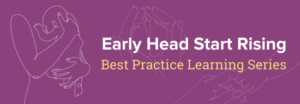
Related Content
EHS Best Practice: Post-partum
Developmental-Relational Frameworks for Understanding and Addressing Post-Partum Depression and Early Parenting
Post-partum mood disturbances affect the individual functioning of parents yet also all the inter-relationships and well-being in a family system, including the new infant. This is often a source of tremendous concern. However, this also offers a profoundly important opportunity to address post-partum depression and anxiety through the lens and portal of the parent-infant relationship. Practitioners across disciplines have the opportunity to enhance care and outcomes for infants and their mothers experiencing post-partum depression. The family system is an opportune focus of treatment to the benefit of all; in relational context. Our efforts need to employ every available strategy to enhance the care for these infant-parent dyads in service of better outcomes for infants’ functioning, as well as enhancing maternal therapeutic treatment. We don’t want to miss opportunities for intervening in the earliest stage of infant-parent attachment; the first 100 days of life when highly consequential bio-behavioral shifts are occurring in the development of the infant brain. This is in service of optimizing infant developmental potential, as well as enhancing mothers’ future-orientation and motivation for treatment in order to best meet the needs of their baby. The impact of parents and other significant adults on children’s early development, emotional well-being, and learning is well-established. Relationships, and the cultural contexts in which they occur, are extraordinarily consequential for development. The quality of the caregiving relationship is the critical factor in mitigating long term deleterious effects on children’s development that can stem from untreated maternal mental health concerns.
This workshop will engage participants in deepening relationship-based, developmentally-informed practice that improves professionals’ and parents’ ability to be successful in understanding and applying child developmental constructs to their daily practice. It will focus on implementing a set of practices such as sharing careful observation of infant behavior and focusing on parents’ strengths to improve parent-provider and parent-child relationships that promote family relational and emotional health and wellness. Aspects of the Brazelton Touchpoints™ Approach will explore both its Developmental and Relational Frameworks; and how parental post-partum mood disturbance in parental self-regulation can affect a parent’s interpretation of, and response to, their infant’s behavior. The workshop will include interactive PowerPoint presentation material and opportunities for discussion in order to orient the participants to developmental-relational practice. These activities will support workforce skills and well-being in service of capacity to serve young children and their families.
Presenter:
 Jayne Singer, Ph.D. IECMH-E
Jayne Singer, Ph.D. IECMH-E
Dr. Singer is a clinical psychologist and Endorsed® Infant and Early Childhood Mental Health Clinical Mentor with over 40 years of experience working in community, hospital, and school based programs, serving children and families with a wide variety of developmental, medical, social, emotional, and familial challenges. At the Brazelton Touchpoints Center in the Division of Developmental Medicine at Boston Children’s Hospital, she serves as Director of Developmental and Relational Health as well as Director of Clinical Training. She engages in clinical practice and continuous national and international teaching and intensive reflective mentoring of the Brazelton Touchpoints Approach and the Newborn Behavioral Observations system. She spearheaded adaptations of the Touchpoints Approach that developed within the field of primary care pediatrics for application in the fields of Early Intervention and Developmental Disabilities, Early Care and Education, Mental Health practice, and Substance Use Disorder Recovery. She is Past President of the Massachusetts Association for Infant Mental Health, and an Assistant Professor of Pediatrics and Psychiatry at the Harvard Medical School, a ZTT-certified trainer of the DC:0-5 system, and the 2022 recipient of the William M. Schafer, PhD, Award to Honor Excellence in Reflective Supervision, Leadership and Inspiration awarded by international Alliance for the Advancement of Infant Mental Health
